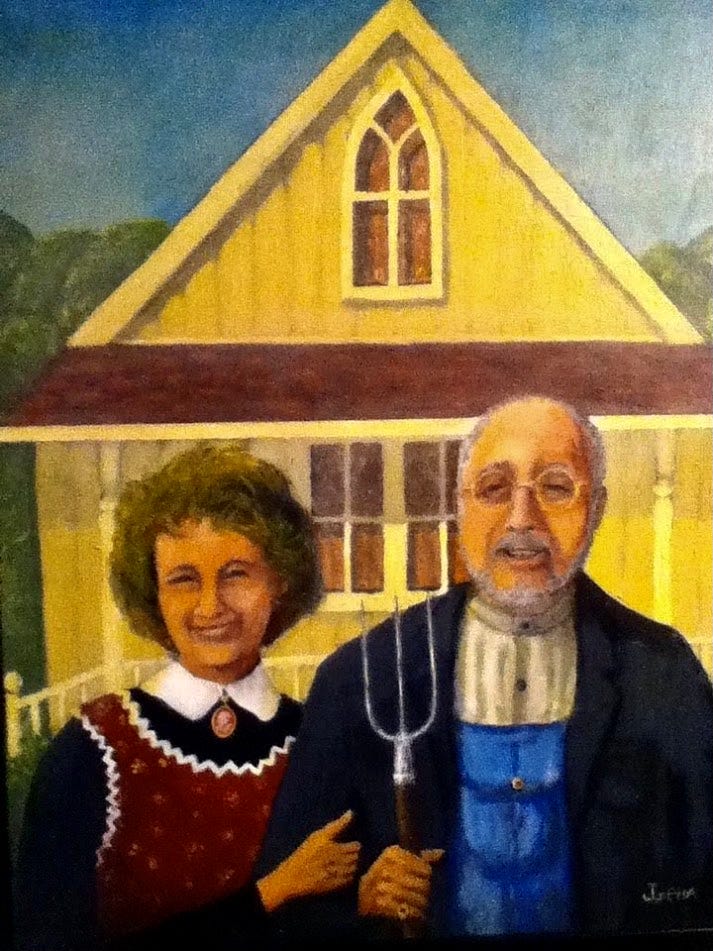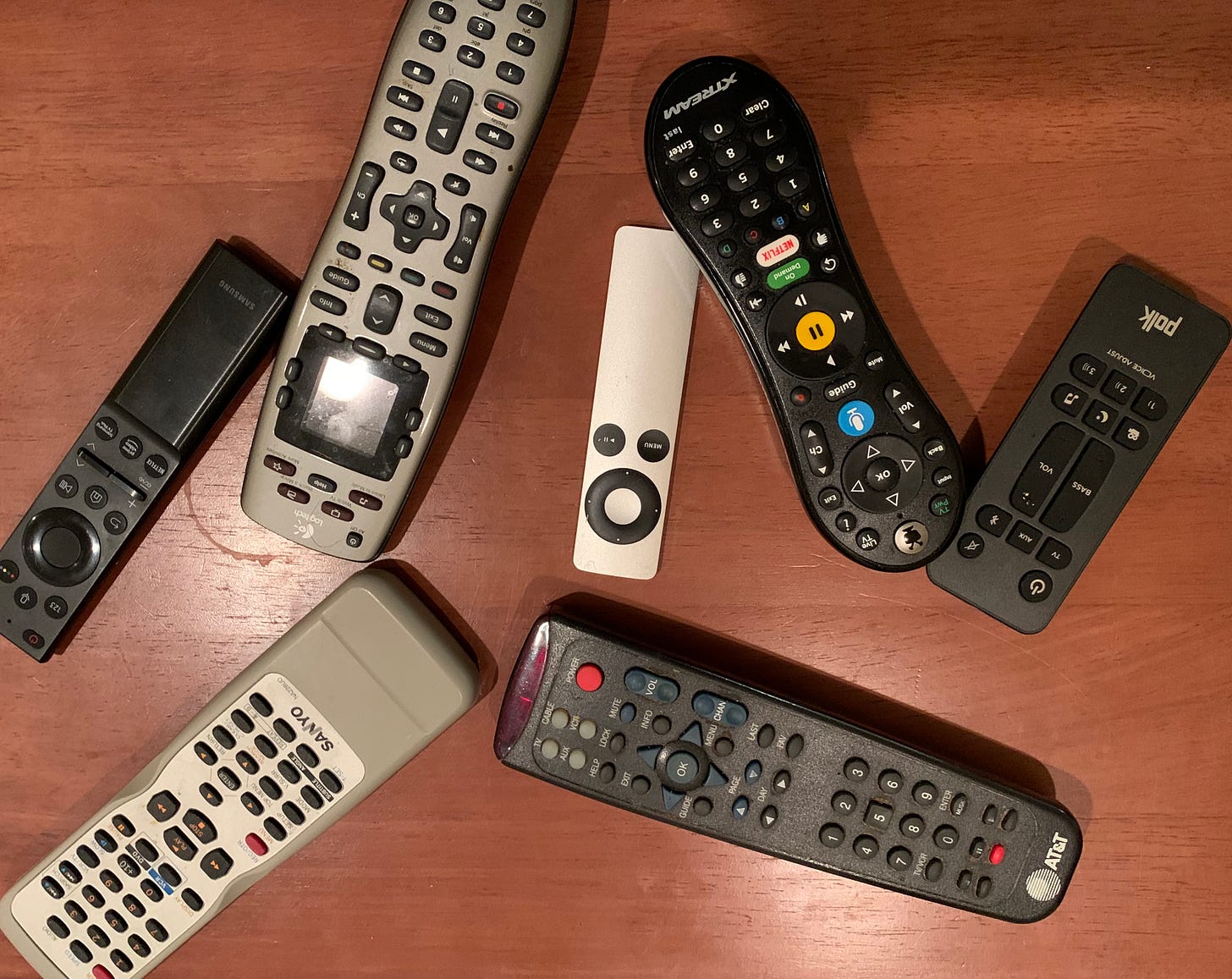Fern: All across this country there are women – smart women, capable in many spheres of public life –who do not know how to turn on their television sets. I am one of those women.
Joe: You know how to turn the tv on. What you don’t know is how to find a program. And you could do it if you tried.
Fern: I have tried. There are just too many buttons on too many different remotes.
Joe: You only half try. And why is that?
Fern: Because you already know how to do it.
Joe: Yes, there’s that. And the older we get, I think there’s a tendency not to step out of relegated comfort zones.
Fern: I used to teach an essay called. “I Want a Wife.” It’s a classic feminist piece which appeared in writing anthologies—yikes!—I think it was probably fifty years ago.
Joe: I never taught that essay. Or maybe I don’t remember.
Fern: Anyway, I thought the essay was funny then. And right on target. Here’s a random sampling:
I want a wife to keep track of the children’s doctor and dentist appointments. And to keep track of mine. I want a wife who takes care of the children who will take care of my physical needs. I want a wife who will keep my house clean. A wife who will pick up after my children, a wife who will pick up after me. I want a wife who will keep my clothes clean, replaced when need be, and who will see to it that my personal things are kept in their proper place so that I can find what I need the minute I need them . . .
Joe: Ok, I get it. Who wouldn’t want a wife?
Fern: Exactly. That was the message.
Joe: But don’t most couples divvy up chores and responsibilities? Who does what is ascertained by preference and expertise. Not always by some gender stereotype.
Fern: When we married thirty years ago . . .
Joe: Thirty of the happiest years I’ve spent in Central Iowa. Actually our last anniversary was the thirty-third.
Fern: Anyway, after the kids were gone, and you took early retirement, I continued to work. Which was fine with me. I liked teaching. And you had more interests than most retired guys: Painting pictures. Writing books. Playing poker. So we changed things around a bit. After retirement, you did all the grocery shopping, the cooking and ran the errands. For which, by the way, I am so grateful. I’m a terrible shopper.
Joe: And me, I happen to love grocery shopping. My dad was a grocer. Just the smells of a grocery store—passing by produce or the butcher counter—brings back such memories of when I was a little boy and my dad making me liverwurst and onion sandwiches.
Joe’s painting of his uncle’s super market where he worked during high school.
Fern: But your dad’s store was more like a bodega with a butcher block in back. No, it’s the really big stores that make me dizzy. Too many choices.
Joe: Or you can see it as a glimpse of the bounty of America. Remember the story you told me the other day about our daughter in New Hampshire? How the foundation she works for brought in disadvantaged students from Africa and the Middle East, and the first thing these students wanted to see was a Wal-Mart Super Center? How they wandered through the whole store and were so reluctant to leave?
Well, I get that. I’m an old country guy, and the old country is all about the marketplace. That’s not just where you shop, it’s also where stories happen. Where you can make little discoveries as you shop to fill the daily needs of your family.
Fern: Well that’s an interesting way to look at shopping, but as long as you’re the one doing the shopping, more power to you!
Joe: It comes down to division of labor by natural selection. I remember the beginning of these thirty happiest years, sitting at the kitchen table, nervously chewing the end of my pen as I struggled to do the monthly bills. You asked what the problem was. I explained that although the bills weren’t excessive and we had enough money, just writing the checks gave me agita. Leftover feelings from when I was young and poor.
You immediately brightened and said, “I like doing bills!” So, I handed you the pen, and I haven’t paid a bill in over thirty years! Division of labor by natural selection!
Fern: You are knowledgeable about fixing things around the house and managing technology. Concerning this last skill, when you attempt to share this information with me, I appear to listen, but I might as well read the directions that came with cable hook-up in Swahili.
Joe: We have our own specific jobs.
Fern: I clean the kitchen. I’ve found that good cooks are also messy. Luckily, I happen to enjoy cleaning the kitchen. Wiping down counters and scrubbing the sink can be an act of meditation. It’s like Zen.
I also like gardening, So I do the outside work.
Joe: I do the driving.
Fern: I help with suggestions about how you’re doing.
Joe: Do you ever!
Fern: I do communications. This includes arranging services (like hiring someone to mow the lawn), issuing complaints to proper channels, making appointments and connecting frequently with three, very chatty daughters.
I make the financial decisions, including how much we should help the children and how much to take out of our retirement accounts. You seem to trust me.
Joe: I do.
Fern: But really, you should know something about our finances. At least I have told you where everything is.
Joe: You have. But then I forget.
Fern: Like how I forget when you show me how to work the GPS or how to strap a grandchild into a car seat.
Joe: We have specialized roles.
Fern: And that is what concerns our adult children: the time when one of us will have to manage alone. I don’t want them to worry so I assure them of our expanding expertise. In truth, I believe it’s not happening. Not yet, anyway.
Joe. It really is a good idea to diversify. But, as in Darwin, necessity is probably the most important teacher of all.






I love this! It's amazing how division of labor just kind of falls naturally. I wonder if every couple has the one who can deal with the remote and the other who can't, because it's the same here. Thanks for this. In the end, it's all about taking care of each other, which is a beautiful thing!
Yes!
You two make me smile.